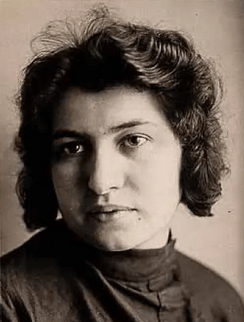Dora Diamant facts for kids
Quick facts for kids
Dora Diamant
|
|
|---|---|

Dora Diamant in 1928
|
|
| Born | c. 1900 Pabianice, Poland
|
| Died | 1952 |
| Other names | Dora Dymant |
| Citizenship | Polish |
| Occupation | Teacher, actress |
| Known for | Last lover of writer Franz Kafka |
| Spouse(s) |
Lutz Lask
(m. 1932) |
| Partner(s) | Franz Kafka (1923–24) |
Dora Diamant (also known as Dwojra Diament or Dymant) was born around 1900 and passed away in 1952. She is best known for her close relationship with the famous writer Franz Kafka. Dora also played a role in trying to keep some of his last writings safe. These writings were later taken by authorities in 1933. Kafka had actually asked for his papers to be destroyed before he died.
Contents
Her Early Life
Dora Diamant was born into a Jewish family in Pabianice, Poland, around 1898. Her father, Herschel Dymant, was a successful businessman and a very religious follower of the Hasidic faith.
After her mother passed away around 1912, her family moved to Będzin. Dora helped raise her ten younger brothers and sisters. When she grew up, she decided not to marry. Instead, she went to Kraków to study to become a kindergarten teacher.
But Dora had other plans. She left Kraków and moved to Berlin, Germany. There, she worked for the Jewish community as a teacher and a seamstress at an orphanage. This is also when she changed the spelling of her name to Diamant.
Meeting Franz Kafka
In July 1923, Dora was volunteering at a camp near the Baltic Sea. This is where she met Franz Kafka. He was 40 years old and was very ill with tuberculosis.
They quickly became very close friends. They spent every day together for three weeks and made plans to live in Berlin. In September, Kafka moved to Berlin to be with Dora. They shared a few different apartments.
Dora stayed by Kafka's side as his illness got worse. She moved with him to a special hospital outside Vienna. Franz Kafka passed away in her arms on June 3, 1924.
Protecting Kafka's Writings
After Kafka's death, Dora faced some challenges. She had burned some of Kafka's papers at his request during his final months. She also decided to keep some of his personal journals and letters.
Kafka's friend, Max Brod, asked Dora to give him all of Kafka's papers. However, Dora kept the letters Kafka had written to her. Max Brod and others also chose not to destroy Kafka's writings, even though Kafka had asked them to.
Dora secretly kept some of Kafka's notebooks. These stayed with her until 1933. That year, authorities raided her apartment, and her papers, including Kafka's notebooks, were taken. No one knows exactly which notebooks Dora had. People have searched for these missing papers for many years.
Life After Kafka
In the late 1920s, Dora studied acting at a drama school in Düsseldorf. She became a professional actress. In 1928, she had a big success playing the main character, Princess Alma, in a play called King Nicolo.
In the 1930s, Dora joined the Communist Party of Germany. She worked as an actress who performed to spread political messages. She married Ludwig (Lutz) Lask, who was an editor for a Communist newspaper.
Dora and Lutz had a daughter named Franziska Marianne Lask, born on March 1, 1934. She was named after Franz Kafka. Sadly, Franziska passed away in London in 1982.
Escaping Danger
In 1936, Dora and her daughter left Germany to join her husband in Soviet Russia. However, Lutz Lask was arrested in 1938 and sent to a labor camp. This happened during a time when many people were arrested in the Soviet Union.
Dora then left the Soviet Union. She traveled across Europe and reached safety in England in 1939, just before Germany invaded Poland. In 1940, Dora and her daughter were held in a camp on the Isle of Man for a short time. They were released in 1941.
Later Years and Legacy
In 1942, Dora returned to London. She gave talks and read Yiddish stories to help keep Jewish language and culture alive. She also worked as a dress designer and opened a restaurant.
From 1945 to 1949, she wrote several articles and essays for a Yiddish journal. In 1949, Dora finally visited the new country of Israel, which had been a lifelong dream.
Dora Diamant passed away in London on August 15, 1952. She was buried in an unmarked grave. In 1999, her family placed a stone at her grave. It reads, "Who knows Dora, knows what love means."
Images for kids
 | Sharif Bey |
 | Hale Woodruff |
 | Richmond Barthé |
 | Purvis Young |


